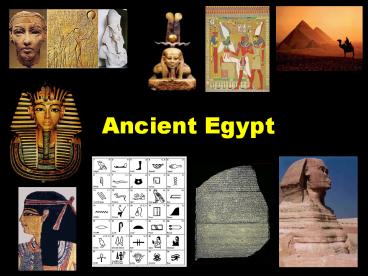The Ancient Egyptians - PowerPoint PPT Presentation
1 / 54
Title: The Ancient Egyptians
1
Ancient Egypt
2
Impact of Geography
- limestone and granite
- long lasting buildings
- long lasting art
- Nile River
- regular flooding positive view of life and
afterlife - floods great soil
- year round water for irrigation
3
Fertile Nile River
4
Annual Flooding of Nile River
5
(No Transcript)
6
Impact of Climate
- arid climate
- hot sun
- large deserts
- dry climate
oil skin
make up for sun protection and black paint to
cut glare
obstacles to invaders
must irrigate crops
7
Nile Irrigation - Shaduf
8
Political Organization
- 3000 BC unification under King Narmer, first
Egyptian dynasty centered at Memphis where Upper
and lower Egypt meet. - pharaoh
- pharaohs had absolute power and owned all land
however, they were expected to behave morally and
were judged on good deeds. - theocracy
- pharaoh stood at center of religion, government,
and army
god-king (son of Horus),
government run by religious leaders
9
Unification of Upper and Lower Egypt
Scorpion King or Narmer
10
Economic System
- traded agricultural surplus wheat barley (from
Nile which provided silt) - mining of large mineral deposits of copper which
used for bronze tools. Gold and copper were mined
by slaves which greatly enriched the royal
treasury. - had enough economic strength to support massive
public works
Construction projects financed by the government
for the benefit and use of its citizens
11
Religion
- polytheistic
- Akhenaton forces Egyptians to worship one god
(monotheism) temporarily - king believed to rule even after death through
his/her ka therefore, tomb more important than
earthly palace
belief in many gods
12
Egyptian Creation Myth
The Goddess Nut
13
Egyptian Gods and Goddesses
The Sacred Trinity
Osiris Isis
Horus
God of the Dead reincarnation of dead
God of the Dead transports the dead
Goddess of Marriage
14
Preparations for the Underworld
ANUBIS weighs the dead persons heart against a
feather.
Priests protected your KA, or soul-spirit
15
Materials used in Mummification
all classes planned for their burials
1. Linen
6. Natron2. Sawdust
7. Onion3. Lichen
8. Nile Mud4. Beeswax
9. Linen Pads5. Resin
10. Frankinsense
16
Preparation for Afterlife
17
Egyptian Mummies
Ramses II1279-1212 B. C. E.
Seti I1291-1278 B. C. E.
Queen Tiye, wife of Amenhotep II1210-1200 B. C.
E.
18
Journey to the Underworld
The dead travel on the Solar Bark.
A boat for the journey is provided for a dead
pharaoh in his tomb.
19
Egyptian Book of the Dead
20
The Final Judgement
Anubis
Horus Osiris
21
Egyptian Social Hierarchy
slaves
22
Some Famous Egyptian Pharaohs
Tutankhamon1336-1327 B. C. E.
Thutmose III1504-1450 B. C. E.
Ramses II1279-1212 B. C. E.
23
Egyptian Nobility
24
Egyptian Priestly Class
25
Egyptian Scribe
26
Shabtis The Pharaohs Servants in the
Afterlife
27
Inventions / Innovations
one of 3 writing systems developed by the
Egyptians for economic, royal, and administrative
info.
- hieroglyphics
- originally pictographs, but eventually pictures
represented words as well as sounds - calendar developed (365 days and 12 months)
- hieroglyphics written on papyrus
- Math
- system of written numbers
- basic geometry (to measure floods)
- Science
- Set broken bones
- Surgery
- checked pulse
a paper-like writing material created from the
papyrus plant that grows on the banks of the Nile.
28
Hieroglyphics Alphabet
24 letters 700 phonetic symbols
29
Papyrus gt paper
Hieratic Scroll Piece
Papyrus Plant
30
Egyptian Math Draftsmenship
1 10 100 1000 10,000 100,000 1,000,000
What number is this?
31
Architecture
- Pyramids tombs for pharaoh's afterlife
- built by peasants when Nile was flooded (not
slaves)
32
Stepped Pyramid at Saqqara
33
Bent Pyramid of King Sneferu
34
Giza Pyramid Complex
35
Plan of the Great Pyramid of Khufu
36
The Valley of the Kings
37
Ancient Egyptian Housing
Middle Class Homes
Peasant Homes
38
Scenes of Ancient EgyptianDaily Life
39
Making Ancient Egyptian Beer
40
Making Ancient Egyptian Wine
41
An Egyptian Womans Must-Haves
Mirror
Perfume
Whigs
42
Champollion the Rosetta Stone
43
Archaeologist, Howard Carter (1922)
44
Entrance to King Tuts Tomb
45
King Tutankhamons Death Mask
1336-1327 B. C. E.
46
King Tutankhamon
47
King Tutankhamuns Tomb
48
Treasures From Tuts Tomb
49
The Valley of the Queens
Temple of Queen Hatshepsut
1473-1458 B. C. E.
50
The Ankh The Cross of Life
51
QueenNefertiti
52
Abu SimbelMonument to Ramses II
1279-1213 B. C. E.
53
Who Are These Strange People?
54
Routes of the Sea Peoples
The end of the Bronze Age!

